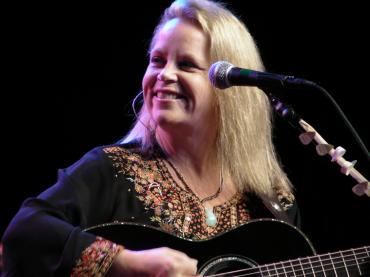‘We Traveled So Far’: Mary Chapin Carpenter at The Barbican, London

A feeling that has frequently dominated Mary Chapin Carpenter’s shows is reflection. An artist who bares her soul through her songs sends audiences home musing over the emotions she so lucidly expressed. Reflection was the theme of Carpenter’s London appearance, deepened this time by her new album Sometimes Just The Sky. With one exception the record is a reworking of previously released songs, released to celebrate her 30 years as a songwriter.
Carpenter’s long-standing band preceded her on stage but her entrance was an understated nod and smile as they eased into “Heroes and Heroines,” a song of breathtaking scope that set the contemplative scene: “A dreamer born is a hero bred on earth and up in Heaven.” Pianist Jon Carroll delicately opened “Why Walk when You Can Fly,” a useful guide to living life to the fullest, “for the rest of the time that you’re given why walk when you can fly high?”
The audience applauded the familiar rhythm of “Stones in the Road.” Carpenter gave this song about the harshness of contemporary life an added sharpness, “We kiss your ass, we make you hold“ by altering the next line, “We doctor the receipt,” to “You send another tweet.” That brought a cheer.
From her previous release, The Things We Are Made Of, came “Something Tamed Something Wild,” but the the new album provided the set’s core. This was not a greatest-hits reprise. As Carpenter explained, she can’t change what prompted her to write a song but she can now give it the prespective of time. For example, she wrote “Naked To The Eye” in response to a breakup in her 30s. Nothing can change how she felt then, but the world didn’t end. On his stripped-down kit, drummer Nate Barnes gently guided Carpenter into the almost confessional “The Moon and St. Christopher.”
Carpenter’s wistful look down the years emerged in her dry wit in between songs. Commenting on the struggles of starting out as a songwriter, she recalled having been asked, “was that a real song, or did you write it?” She did not add her response at the time but her diplomatic skills are undimmed as she deftly sidestepped a similarly crass comment about her political allegiance shouted from deep within the Barbican’s cavernous auditorium.
As the songs flowed it seemed like there has been very little reworking, rather each had been taken out of its box and given a loving polish. “This Shirt” remains a perfect example of how Carpenter can turn something as commonplace as a shirt into a symbol of life, love, happiness, wonder, and grief. “What Does it Mean to Travel” contemplates, “And I don’t want to be a stranger/And I don’t want to be alone/But sometimes I just want to be somewhere else/Untethered and unknown/When I am far from home.”
There were some more upbeat moments on Lucinda Williams’ “Passionate Kisses” and “I Feel Lucky” when Carpenter rocked with her superb band. Guitarist Johnny “Duke” lay down some very bluesy licks to complement his earlier mastery of guitars and mandolin. For the record, the band were all superb whether in their individual moments or the way they all supported Carpenter.
Carpenter harnessed that energy to fuel the remainder of the set. Her excellent support, Emily Barker, joined her for a rousing “He Thinks He’ll Keep Her.” Introducing the song, Carpenter noted the perils of bringing songs up to date. For example, who knows what a typing pool is nowadays? (I do, as do most people in the audience, I’d suggest.) But “swimming” makes no sense, so back to the original lines, “For 15 years she had a job and not one raise in pay/Now she’s in the typing pool at minimum wage.” She did write this in 1972, and we should reflect on why its sentiment hasn’t gone the way of the typewriter.
The new record’s title track and only new composition, “Sometimes Just the Sky,” was the perfect selection. Carpenter was inspired by Patti Smith talking about no matter how many disappointments and hardships life throws up there is still so much that’s beautiful. These pleasures may be very simple, perhaps just talking to an old friend, but they do represent why life’s worth living.
That seemed a worthy reflective point to end the performance, but in the second of two encores, Carpenter gave a more personal edge to that message with “I Have A Need For Solitude.” The title says it all, but it isn’t an enforced or sad solitude. Carpenter recognizes the need to reflect and recharge back home on her remote farm in the mountains. If tonight’s show is the result then we must wish her every good wish on her 30 years as a songwriter but also wish that she continue to seek plenty of solace in nature and please keep on writing.


